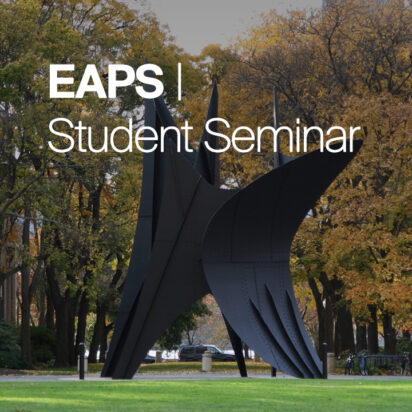
[ESAC Student Seminar] Perrin Davidson
Date: Tuesday, May 7, 2024 Time: 12:00 - 1:00pm Location: 54-1827 | MIT Campus, Cambridge, MA“The Rise and Fall of Carbon Cycle Instabilities”
Observational records of the global carbon cycle show apparent instabilities throughout the last ∼66 Myr of Earth’s history, in an era known as the Cenozoic. It has been hypothesized that such instabilities are caused by rate-induced tipping events, or a change in the steady state of the earth system upon an environmental variable changing faster than a critical rate. However, proving this hypothesis is surprisingly difficult given the complexity of the system, despite being of great interest given the current rate of anthropogenically emitted CO2. Luckily, recent work provides a possible route forward by demonstrating that one can treat the carbon cycle as a non- linear, non-autonomous dynamical system—that is, a system that displays characteristic behavior through time, driven by time-dependent forcings. Building on this result, the question we address is deceptively simple: how do these instabilities come into and out of existence? Here we use paleoclimatological data to show that these carbon cycle instabilities are possibly rate-induced, resonant excitations from a stable state to which the carbon cycle eventually relaxes. Given timing uncertainties in sedimentary benthic foraminifera data, we develop an algorithm to extract characteristic carbon cycle excitations spanning the Cenozoic, displaying fundamentally different behavior between green- and icehouse climate states. These characteristic excitations allow us to identify pre-onset excursions paced by orbital forcings as the likely rate-induced cause of carbon cycle excitations, with symmetric post-onset excursions suggesting the instabilities are resonant excitations. We further identify broader systematic changes in the behavior of the climate system between the two Cenozoic climate states, corroborating changes seen in excitation reconstruction. Our results indicate a potential set of universal mechanisms behind both the rise and fall of carbon cycle instabilities. We use our results to inform formulation of a low-dimensional, damped model of the global carbon cycle, from which further investigations can elucidate drivers of past climatic shifts to better constrain future climate scenarios.
ESAC Student Seminar Series
A forum for students and postdocs to share recent research, hone presentation skills, and build community among peers, sponsored by the EAPS Student Advisory Committee. Open to current EAPS graduate and undergraduate students and postdocs. Typically hosted on Thursdays during the semester, including pizza lunch.
Contact: esac.officers@gmail.com
